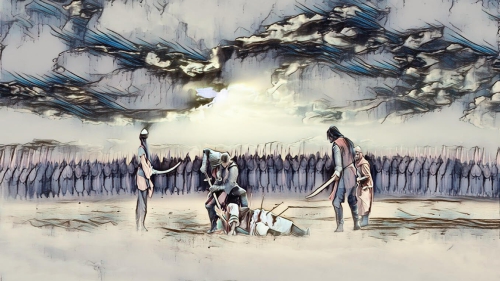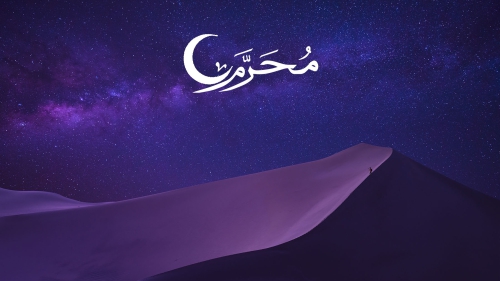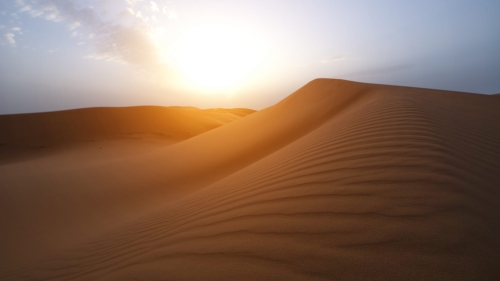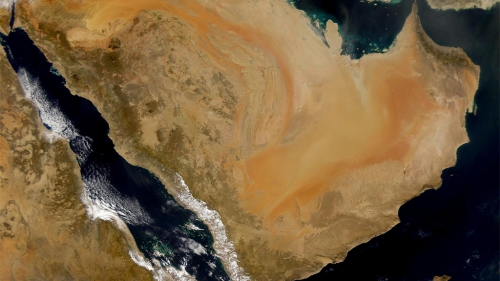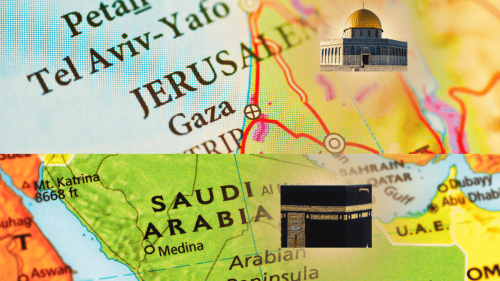An African Nation is the Muslims' First Refuge

In Islamic history and tradition, Ethiopia (Abyssinia or Al-Habasha) is known as the "Haven of the First Migration or Hijra."
For Muslims, Ethiopia is synonymous with freedom from persecution and emancipation from fear.
Ethiopia was a land where its king, Negus or Al-Najashi, was a person renowned for justice and in whose land human rights were cherished.
The meaning and the significance of "Hijra" is embodied in the Islamic calendar. Since its inception, the Islamic calendar represents a history of perpetual struggle between truth and falsehood, faith and blasphemy, freedom and oppression, light and darkness, and between peace and war.
The first migration [Hijra] of the Companions and relatives of the Prophet Muhammad (peace and blessings be upon him) to Ethiopia celebrates the birth of freedom of expression and beliefs, whereas, the Second Migration of the Prophet Muhammad to the Madinah celebrates the end of oppression.
"And dispute you not with the People of the Book, except with means better, unless it be with those of them who inflict wrong; But say, we believe in the Revelation which has come down to us and in that which came down to you: Our God and your God is one; and it is to Him we bow in Islam: (Quran 29:46).
History has shown that the first migration to Ethiopia and the second migration to Madinah have indeed laid down the foundation on which Islam, as a universal religion, was built. Ever since that experience, the Muslim community, wherever they settled, shifted from the positive of minority to majority, from weakness to permanent strength, from tribalism to universal brotherhood that knows no defined political boundaries.
The Quran says: "O mankind! We created you from a single soul, male and female, and made you into nations and tribes, so that you may come to know one another. Truly the most honored of you in God's sight is the greatest of you in piety. God is All-Knowing, All-Aware (Quran 49:13).
With this spirit in mind, Bilal ibn Rabah, an Ethiopian slave living in Makkah, became a leading companion of the Prophet Muhammad. It was not a coincidence that his native land, Ethiopia, was the country chosen by the Prophet when his followers needed protection and freedom form oppression.
Muhammad Haykal, author of the "Life of Muhammad" said that the Prophet Muhammad trusted that his followers and relatives would be better off if they migrated to a country whose religion was Christianity-a scriptural religion whose Prophet was Jesus son of Mary. He was not afraid that his followers would convert and give up their faith in favor of any other established religion.
He was more convinced that Islam would be more protected in its infancy in a fertile and prosperous land ruled by the Scripture than among the ignominious pagans of Arabia.
The companions and relatives of the Prophet were prepared to sacrifice and suffer all sorts of hardship and alienation rather than give up their own conviction and freedom. The Prophet gave his companions the following letter to give the king when they reached Ethiopia.
"In the Name of Allah, the Most Merciful, Most Gracious, From Muhammad, the Messenger of Allah to the Negus Al-Asham, king of Abyssinia.
Peace, I praise Allah to you, the King, the Holy, the Peace, the Faithful, the Watcher, and I bear witness that Jesus, son of Mary, is the Spirit of Allah and His Word, Which He cast to Mary the virgin, the good, the pure, so that she conceived Jesus. Allah created him from His Spirit and His Breathing as He created Adam by His Hand and His Breathing. I call you to Allah, the Unique without partner, and to His obedience, and to follow me and believe in that which came to me, for I am the Messenger of Allah.
I have sent to you my cousin Jafar with a number of Muslims, and when they come, entertain them without haughtiness, for I invite you and your armies to Allah. I have accomplished my work and my admonition, so receive my advice. Peace upon all those that follow True Guidance."
In view of this determination, the Ethiopian king, Negus As'ha'mah, undoubtedly recognized the significance of the Prophet Muhammad as a Messenger of Allah, and the need to treat the Muslims with kindness and dignity. The Christian church leaders who listened to the debate between the Muslims learned the truth about Islam.
Thus, they accepted the universality of the message of the Prophet based on the truthful similarity with the Scripture which prophesied the advent of Muhammad as a Prophet. The Quran describes their belief in these words:
"And when they listen to revelation received by the Messenger, you will see their eyes overflowing with tears, for they recognize the Truth. They pray: ‘Our Lord! we believe; write us among the witnesses" (Quran 5:83).
In the sixth year of the Hijra, the Prophet wrote letters to different rulers of the world inviting them to Islam. Among the first leaders to receive the letter was the King of Ethiopia (Abyssinia). This second letter was sent with Amir ibn Umayya and reads as follows:
In the Name of Allah, the Most Merciful, Most Gracious. From Muhammad,t the Messenger of Allah, to the Negus Al-Asham, king of Abyssinia, Peace is for the one who follows the right guidance and believes in Allah and His Messenger. I bear witness that there is no god but Allah. He is one and has no partners. He has neither wife nor child. And Muhammad is His servant and His Messenger.
I call you to Islam for I am His Messenger. Accept Islam and you will be safe. O people of the Book! Come to something which is common between us and you, that we worship none by Allah; nor associate anything with Him; nor make any other our Lord besides Allah. If they turn away, then tell them we are obedient to Allah. If you deny it, the burden of the Christians, your people, will fall upon you." The seal of Muhammad, the Messenger.
The king received the envoy of the Prophet with great respect and showed him all the honor he deserved, and accepted Islam despite the objection of his family and the Church.
The king wrote back saying"...I testify that you are the Messenger of Allah, true and confirming those before you. I have given my allegiance to you and to your nephew and I have surrendered myself through him to the Lord of the Worlds."
In recognition of his kindness and when it was revealed to the Prophet that the Ethiopian king whom he had never met in person passed away, the Prophet offered the first funeral prayer in absentia in Islam (Salatul Ghaib) for the king who was named Ahmed Al-Najashi after he reverted to Islam.
Even though the family of the Ethiopian king, joined by the church, revolted against him because of his acceptance of Islam, and tried to stop the spreading of Islam, Islam rapidly and peacefully spread south of the Anunite kingdom.
By the fourteenth century, there were seven Islamic Sultanates [kingdoms]. The Sultanate of Yifat, Dawaro, Arbabini, Hadiya, Shakara, Bali, and Dara survived as Muslim enclaves until the northern Christian, with the help of European colonial powers, mainly from Portugal, expanded by force and by the late 18th century, formed "Ethiopia" as we know it today.
Based on the Europe World Year Book 1991 and UNICEF/ETHIOPIA the estimated number of Ethiopian Muslims, which ranges between 23.9 million to 27.7 million (45 percent-52 percent), ranks as the third largest Muslim population in Africa after Nigeria and Egypt.
Overall, it is three times as large as Somalia, Guinea or Niger, 1.2 times as large as the Sudan's Muslim population; twice as large as Yemen or Saudi Arabia or Syria; six times as large as Libya; 1.5 times as large as Iraq; 1.1 times as large as Algeria or Morocco.
Yet, despite the scale of abuses and suffering of the Muslim people of Ethiopia, their agony was largely ignored by the world community, especially by the Muslim world.
According to Ethiopian Muslims' estimate, their number is between 65 and 70 percent of the total population.
Government after succeeding government made the effort to portray Ethiopia as an island of Christianity by minimizing the number of Ethiopian Muslims.
For centuries, the policy of fear and distrust forced the monarchy, which was overthrown in 1974, and the church to espouse an oppressive posture in relation to the Muslim populace, a majority in Ethiopia, consisting of ethnically diverse groups largely living in rural areas.
Moreover, their distrustful policy towards the surrounding neighbors led to centuries of unwarranted isolation from the rest of the world.
The monarchs, with the blessing of the Church, committed unparalleled genocide against the Muslims of Ethiopia in order to create a one-religion and, if possible, a one-ethnic empire.
In their effort to uproot Islam from the country, they have employed the services of western missionary groups who relentlessly devoted their time and financial resources for the main purpose of converting Muslims, especially orphan children of famine and drought victims, to Christianity.
By contrast, any religious, educational, cultural or trade access to the Ethiopian Muslims from the surrounding neighbors used to provoke the anxiety of the isolationists who dominated the traditional political power structure over 700 years.
Very often when the Ethiopian Muslims performed Hajj or Umra pilgrimages in large numbers, it is considered as a sudden rise of "Islamic Fundamentalism" in spite of the fact that the annual pilgrimage to Mecca is one of the sacred pillars of Islam for those who can financially afford it.
To build Islamic schools was out of question. Yet Muslims were forced to financially contribute for church buildings, and in most cases their fertile lands were confiscated and handed over to the church.
Prior to 1974, the church owned a third of the fertile lands in the country.
To build their mosques, Muslims had to obtain building permits from the church, and in most cases they are denied. The injustices committed against the Muslims of Ethiopia are so enormous that it is impossible to fully detail them here.
It is indeed Divine intervention from Allah that Islam not only survived but also flourished in Ethiopia.
The struggle of Ethiopian Muslims to save their religion and protect their basic God-given human rights went unnoticed by the outside world.
A few among the most honored Muslim leaders in Ethiopia who struggled hard to save Islam by traveling throughout the country and teaching the religion are Sheikh Abadir of Harar, Sheikh Nur Hussein of Bale, Sheich Aba Budelah who is known as Aba Ramuz of Abret in Chancho, and Sheikh Tola and Sheikh Muhammad Sani Habib of Wollo.
These Muslim legends, with the help and Mercy of Allah, left behind a legacy of true dedication and struggle for us to emulate. There are thousands of their students who are following their footsteps.
Among the well-known Ulemas nowadays is Sheikh Muhammad Wale of Darra. He has been incarcerated since February 1995 for no reason other than trying to teach Islam and advocate the human rights of the Muslims.
Of late, it has been observed that the Ethiopian government-in conjunction with the Eritrean government and with the financial support of the American and Israeli governments, has revived a dormant Muslim phobia anchored in isolationist mentality and historically engendered feuds with neighbors across the Red Sea, and neighboring countries in East and Northeast Africa such as Somalia and the Sudan.
This act is a source of threat to the political and economic stability of the region.
The coordination of anti-Islamic and anti-Muslim policies of the Ethiopian and Eritrean governments started with the subjugation of their own Muslim communities.
The Ethiopian government has fallen into the trap of the false beliefs of the New World Order. Espousing any policy that undermines freedom and is injurious to the self-image of Muslims is considered in the interest of the stability of the region from the so-called invaders or what euphemistically is known in the modern parlance of the political and religious opposition as fundamentalists.
This fabricated paternalistic insult to the Muslim is certainly detrimental to dialogue, peace and stability.
Since the peaceful December 1994 demonstration of Ethiopian Muslims demanding justice and equality, the government has taken drastic actions to suppress the Muslims community leaders elected to run the day to day affairs of the Muslim community are still languishing in the main prison of Addis Ababa.
Quranic schools were closed and all governmental and non-governmental Islamic humanitarian organizations were ordered to close and leave the country. Tens of thousands of imported written materials about Islam are sitting in the custom warehouses and are ordered to be burned. Yet again, the Ethiopian government has deliberately failed to refrain from direct involvement in the internal affairs of the Muslim people by conducting an election for the Supreme Council for Islamic Affairs and having its cronies control the Council.
Most of the so-called elected are not religiously qualified to run the affairs of the Muslims. The Council's first action taken was to pass a ruling that any volunteer who teaches Quran in mosques or any individual who wants to participate in Dawa work must obtain a license. This procedure is used as a control mechanism.
By contrast, there are over 100 church groups freely roaming the country teaching their religion. There are 96 different weekly and monthly Christian magazines and booklets flooding the country by the millions. Their primary target, as one official of the World Council of Churches stated, is to Christianize the entire population of Ethiopia.
It is irrefutable and historically true that the Muslim majority in Ethiopia have been the victims of horrific persecution for a long time under Ethiopian Christian rulers who are sustained by European powers.
The Ethiopian rulers, from the time right after Ahmed Al-Najashi all the way down to the present regime, have developed a deep-rooted hatred for Islam.
Religious persecution and cultural domination, characterized by the destruction of mosques and Islamic schools, detention and even execution of local Imams, religious leaders, Sheikhs, and the burning of the copies of the Quran and other religious books was rampant under the Christian rulers of Ethiopia.
It is time for Muslims around the world to open their eyes and see what is happening to their brothers and sisters in Ethiopia.
The land of the first Hijra is being groomed once again by the enemies of equality, justice and human rights to be the bastion of Christianity in East Africa. This i the New World Order in practice.
Insha Allah, they will fail miserably. Allah reminds us in the Quran: "Remember how the unbelievers plotted against thee, to keep thee in bonds, or slay thee, or get thee out of our home. Thy plot and plan. And Allah too plans, but the best of planners is Allah" (Quran 8:30).
Allah's Apostle said: A Muslim is a brother of another Muslim, so he should not oppress him, nor should he hand him over to an oppressor. Whoever fulfilled the needs of his brother, Allah will fulfill his needs; whoever brought his Muslim brother out of discomfort, Allah will bring him out of the discomforts of the Day of Resurrection, and whoever screened a Muslim, Allah will screen him on the Day of Resurrection (narrated by Abdullah bin Umar)
*****
When this article was first published, Najib Mohammed was the President of the Washington, D.C.-based Federation of Ethiopian Muslims in North America (FEMNA).
This article was originally published in The Message magazine's June/July 1997 issue.
Source: Sound Vision
Topics: Africa, African Muslim, Ethiopia, History
Views: 4890
Related Suggestions






